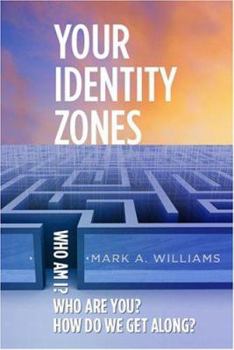Your Identity Zones: Who Am I? Who Are You? How Do We Get Along?
In the divisive atmosphere following the Election of 2004, this ground-breaking new book reveals a new way to understand ourselves and others by mapping our "Identity Zones." Renowned identity expert... This description may be from another edition of this product.
Format:Paperback
Language:English
ISBN:1931868905
ISBN13:9781931868907
Release Date:October 2004
Publisher:Capital Books (VA)
Length:229 Pages
Weight:0.76 lbs.
Dimensions:0.5" x 6.0" x 9.0"
Related Subjects
Business Business & Investing Communications Health, Fitness & Dieting Health, Fitness & Dieting Interpersonal Relations Management Management & Leadership Native American Studies Parenting & Relationships Personal Transformation Politics & Social Sciences Psychology & Counseling Relationships Self Help Self-Help Self-Help & Psychology Skills Social Sciences Specific DemographicsCustomer Reviews
1 rating
Best Book on Interpersonal Dynamics!
Published by Thriftbooks.com User , 19 years ago
Mark Williams has written another insightful book about interpersonal dynamics that improves our understanding of our relationships with others. His previous book, "The 10 Lenses", provided a constructive framework for thinking about diversity issues. His new book, "Your Identity Zones", digs even deeper into what attracts some people to others, and conversely, what causes certain personalities to clash. This book is an in-depth, highly sophisticated analysis of human interactions. Other books of its kind typically attempt to distill personal characteristics into a small number of easily understood boxes, oversimplifying our differences and similarities. This analysis begins with the premise that we humans are much more multi-faceted, with a broad array of values or affiliations that define our lives. For example, a key determinant in whether people work well together is not just whether they share the same values or affiliations, but whether they share a similar depth of feeling about those values and affiliations. "Your Identity Zones" lays out a typology to analyze an individual's values (like honesty, courtesy, generosity) and affiliations (such as race, gender, religion). It analyzes the degree of one's sensitivity or depth of feeling ("hot" to "cold") on key values and affiliations. It discusses how open we are to having friends who are different from us. It asks us to consider how "activist" we are willing to be in support of our values or affiliations, and whether we seek to transform or reform the status quo. Finally, it asks how empowered we do or do not feel. All of these factors affect relationships. By using Mark Williams' typology to analyze, in objective terms, the causes of differences among people, we are led to a deeper understanding of the sources of conflicts, whether they occur on-the-job, in a volunteer organizational setting, on the sports field, or among family and friends. As we better understand the sources of conflict, we are better equipped to take appropriate steps to reduce or intelligently manage the conflicts that regularly confront all of us. For this reviewer, in the first week after I read this book, I found myself immediately using the typology to better understand several major conflicts that confronted me. This book has been a great benefit to me, and I highly recommend it. It helps us understand why we choose to associate with certain people but prefer to avoid others. It helps us understand why another person might get terribly angry at a particular situation when we think it's just "no big deal". Conversely, it helps us understand why other people don't appear to care very much about issues that move us deeply. A greater understanding of these dynamics helps us bridge differences between people. Great stuff, once again, Mr. Williams!




